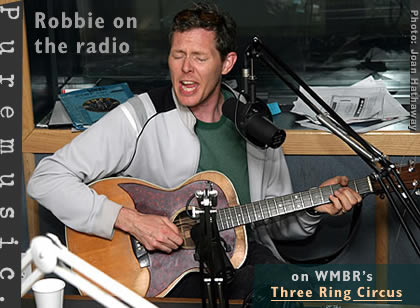
A Conversation with Robbie Fulks (continued)
PM: Maybe you'd share something for the readers about your co-writer on a pair of tunes, Dallas Wayne.
RF: Well, Dallas is an old friend. So right there, that's more important to me. To sit down to write a song with somebody that you know, and with whom you have a history in common, not just an opinion of how good they are as a writer--not that Dallas isn't very good as a writer. But we've written probably a half a dozen, maybe ten songs over the years, at his place outside of Chicago, just killing an afternoon and drinking a beer, and trying to keep his dog off my lap.
PM: [laughs]
RF: And that kind of writing, for me, it's a lot more fruitful than trying to be set up with some guy that I don't know, and sit in a conference room.
PM: Personally, I only write with my friends, because nothing else is really comfortable for me. I just figure you get a much better song.
RF: Yeah, it's the same for me. I'm like a kind of a shy guy, and I don't like to open up and share a lot with somebody that I just met.
PM: Sure. You want to be able to say, "Nah, let's go over here. Let's not do that. How about this?" And you want the other guy to be able to say, "Nah, not that. How about this?"
RF: Exactly. There's got to be a level of trust in each other. It's tough with me, because I'm saying, "Nah" all the time--
PM: [laughs]
RF: --to my own lines or anybody else's lines, I don't care. The first time I wrote with Al Anderson, for instance, in a way I was scared to walk into the room and just meet him because I'd been an NRBQ fan for so long.
PM: Me too, yeah.
RF: But once we actually got to the business of writing, I just forgot, and I was like, "Nah, I don't like that line." I just forgot about who I was talking to.
PM: Really? Because some people find him so intimidating.
RF: He is. He's a very intimidating personality. But what you throw out is just so important to writing--you've really got to have a self-censoring attitude when you're writing.
PM: Yeah. And yet when Al came down to the studio recently to do an interview with me, he was just sweetness itself. And he'd pull an old jazz guitar off the wall to illustrate a point and say, "I learned all my chords from Ray Charles," and then play a Ray Charles tune and at every pass at the chorus he'd play different voicings just like on the record. And I was saying, "Oh, jeez, Al, I wish I had a video camera." He was unbelievable.
So on the shows lately, and maybe on the show at the Opry, are you still doing crazy stuff like busting out a Michael Jackson song if it suits you, or?
RF: Yeah, well we did the Opry Plaza two years ago. They let people on the Opry at a certain hour, like 10:00 o'clock. You're facing 3,000 people who are just kind of passing by your little stage there. And the moment that happened, we were doing "Black or White" by Michael. And the people who booked the Opry were so pleased with that--I think the reason they rebooked me there was because they just enjoyed watching the car wreck expressions of people as they passed by and stared at me doing a Michael Jackson song.
PM: [laughs] Your performing persona is so eclectic, are your listening habits even more far flung?
RF: I guess so, yeah. I like everything, really. If I don't understand it, then I really try to.
PM: Wow. Anybody good on the box lately that comes to mind?
RF: Well, I've been listening to Sarah Borges and enjoying her record a lot.
PM: Is that how she says her name?
RF: I think so, yeah, like gorgeous. I've also been enjoying this guy Keith Gattis--you probably know Keith, right?
PM: No. Who's he?
RF: He plays with Dwight Yoakam. He's another one of these sort of all-around musical guys--a great singer, great player, and real good writer. He did a major label record in the mid-90s in Nashville that was produced by Norro Wilson. It has a real Buck Owens/George Jones vibe to it, like that era when guys like George Ducas would cut a cool record but it would be recorded by Richard Bennett and played by all these guys. So anyway, it's a record that's really got that vibe. And then the new record that he's got out is totally unlike that. It's much more like Waylon Payne--he produced Waylon's records, so it's got a lot of the same kind of sounds on it.
PM: Ah, yeah. Okay. We're going to get on to him right away.
Read anything lately that turned you on?
RF: Oh, well, I just finished that Ruth Reichl memoir--she was the New York Times restaurant critic--about growing up with a mom who cooked a lot of food with mold on it--
PM: Oh, my God.
RF: That was a pretty quick read. I wouldn't say it was super deep, but it was fun.
PM: And what's the author's name?
RF: Her last name is R-e-i-c-h-l, her first name is Ruth.
PM: Right. And she's the food writer. Okay. continue
print (pdf) listen to clips puremusic home